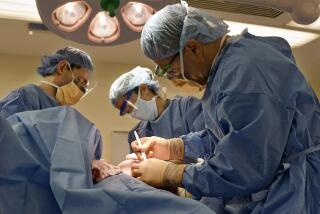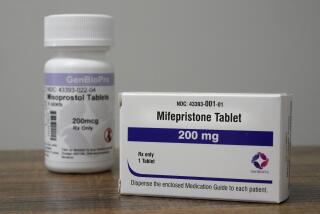Breast cancer rates fall
- Share via
U.S. breast cancer rates dropped 7% in 2003 after millions of women stopped taking hormone drugs for symptoms of menopause because the drugs had been linked to an increased risk of developing the disease, researchers said Thursday.
The sharp decrease was driven by a slide in the type of breast cancer that needs the hormone estrogen to grow, which accounts for 70% of all cases of the disease.
The decline was the largest since 1990, researchers said at the San Antonio Breast Cancer Symposium.
The study, funded by the National Cancer Institute and the M.D. Anderson Cancer Center in Houston, concluded that 14,000 fewer women were diagnosed with breast cancer in 2003 than in 2002. More than 200,000 cases of breast cancer are diagnosed each year.
“Our whole group looked at the numbers and said, ‘Is this real?’ ” said co-author Dr. Rowan Chlebowski of the Los Angeles Biomedical Research Institute at Harbor-UCLA Medical Center.
“After years of trying to defeat breast cancer by reducing it once it has occurred, it was a revelation to think that maybe there’s an opportunity to decrease the risk of getting cancer to begin with,” he said.
Though researchers hailed the news, some cautioned that it was still too early to tell whether the downward trend would continue.
Dr. Julia Smith of the New York University Cancer Institute, who was not involved in the research, said undetectable tumors could still be present only to surface in the future.
“We may have slowed their growth trajectory so that if we don’t see them this year, we may see them next year or in subsequent years,” she said. “We have to reserve judgment.”
Though the study doesn’t prove a causal link between the drop in hormone usage and the slide in breast cancer rates, it is the only plausible explanation, Chlebowski said.
There was a 1% drop in mammograms in 2003, which might mean fewer diagnoses but would not account for the large decline in cancer rates, he said.
“To have this kind of drop in cancer rates you need something very big to explain it,” he said.
The results are in line with a recent study that found the incidence of breast cancer among patients in Kaiser Permanente’s Northern California region fell 10% from 2001 to 2003 while use of hormone replacement therapy dropped 68%.
That report, published last month in the Journal of Clinical Oncology, also found that breast cancer rates throughout California fell 11% during the same period and continued to decline in 2004.
Taken together, the studies provide “strong supporting evidence” of the link between hormone therapy and breast cancer, said Lisa J. Herrinton, a Kaiser Permanente epidemiologist and co-author of the earlier study.
Prescriptions for the hormones estrogen and progestin fell by almost half after government researchers concluded in mid-2002 that hormone replacement therapy increased the risk of breast cancer in post-menopausal women.
Nearly 40% of post-menopausal women used the hormones to ease menopausal symptoms, such as hot flashes, and to prevent conditions related to aging, including osteoporosis.
Years of hormones
Many of the women had taken the hormones for years. Their use had been popularized in the 1960s by New York gynecologist Robert A. Wilson, who wrote a book, “Feminine Forever,” that touted the benefits of hormone therapy to combat the “tragedy of menopause.”
Estrogen could keep women energetic, young-looking and straight-backed into old age, he said.
Scientists came to believe estrogen could also protect women from heart attacks and stroke.
But concerns about the therapy grew, and in 1993, the government launched the Women’s Health Initiative study.
The study included nearly 17,000 women and was abruptly halted three years before its scheduled end when scientists discovered a slight but significant increase in breast cancer, heart attacks, blood clots and strokes.
The latest study found that breast cancers fueled by estrogen fell 8% in 2003, twice the rate of breast cancers that do not rely on the hormone. In women ages 50 to 69, new cases of estrogen-related breast cancer fell 12%.
Dr. Peter Ravdin of M.D. Anderson, a study co-author, said it was not clear whether discontinuation of hormone therapy completely stopped very small cancers from growing or merely slowed them down so they remained undetectable.
Ravdin said that the figures for 2004 would be available in several more months and that researchers would be able to see whether the trend held up.






